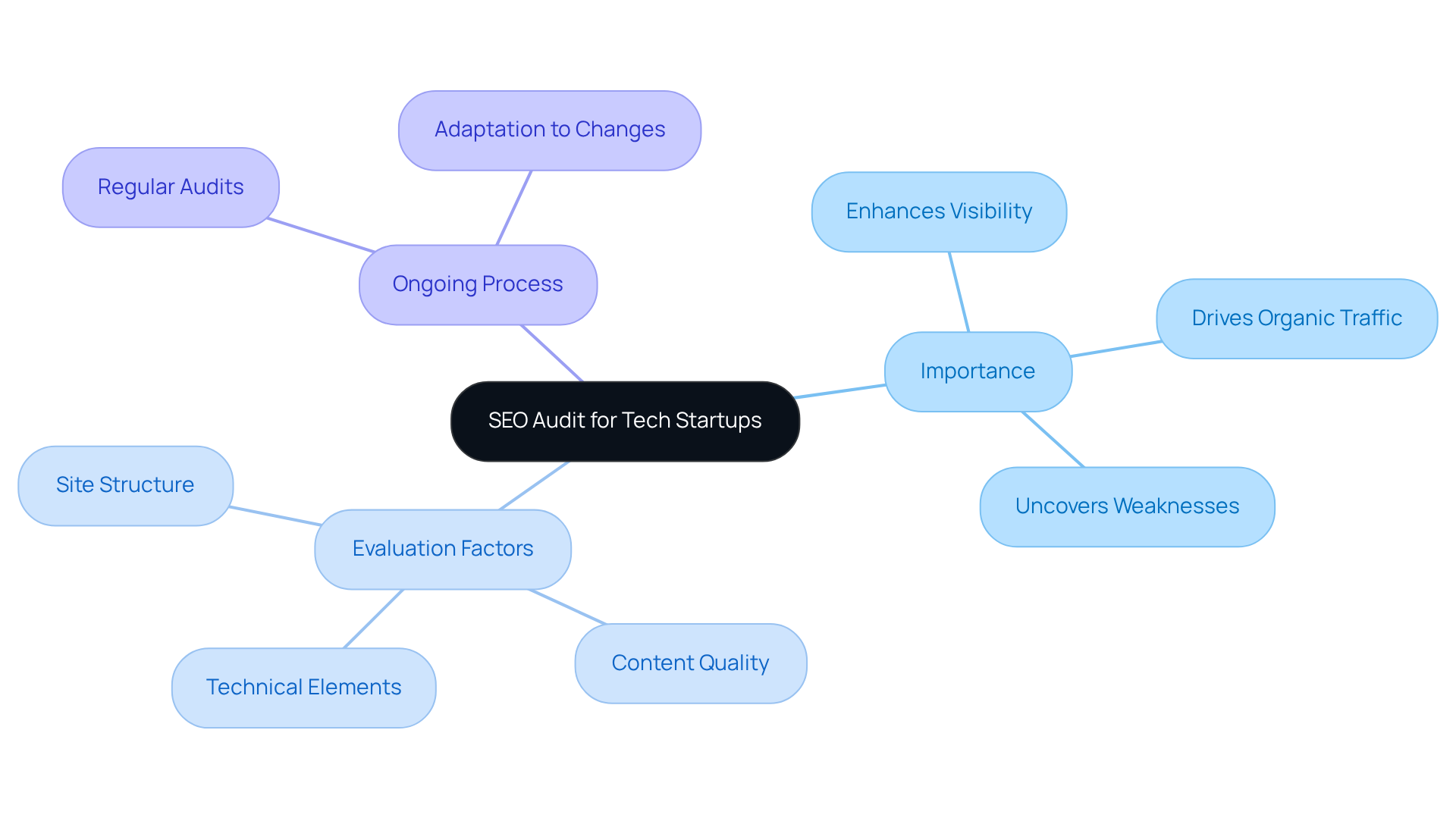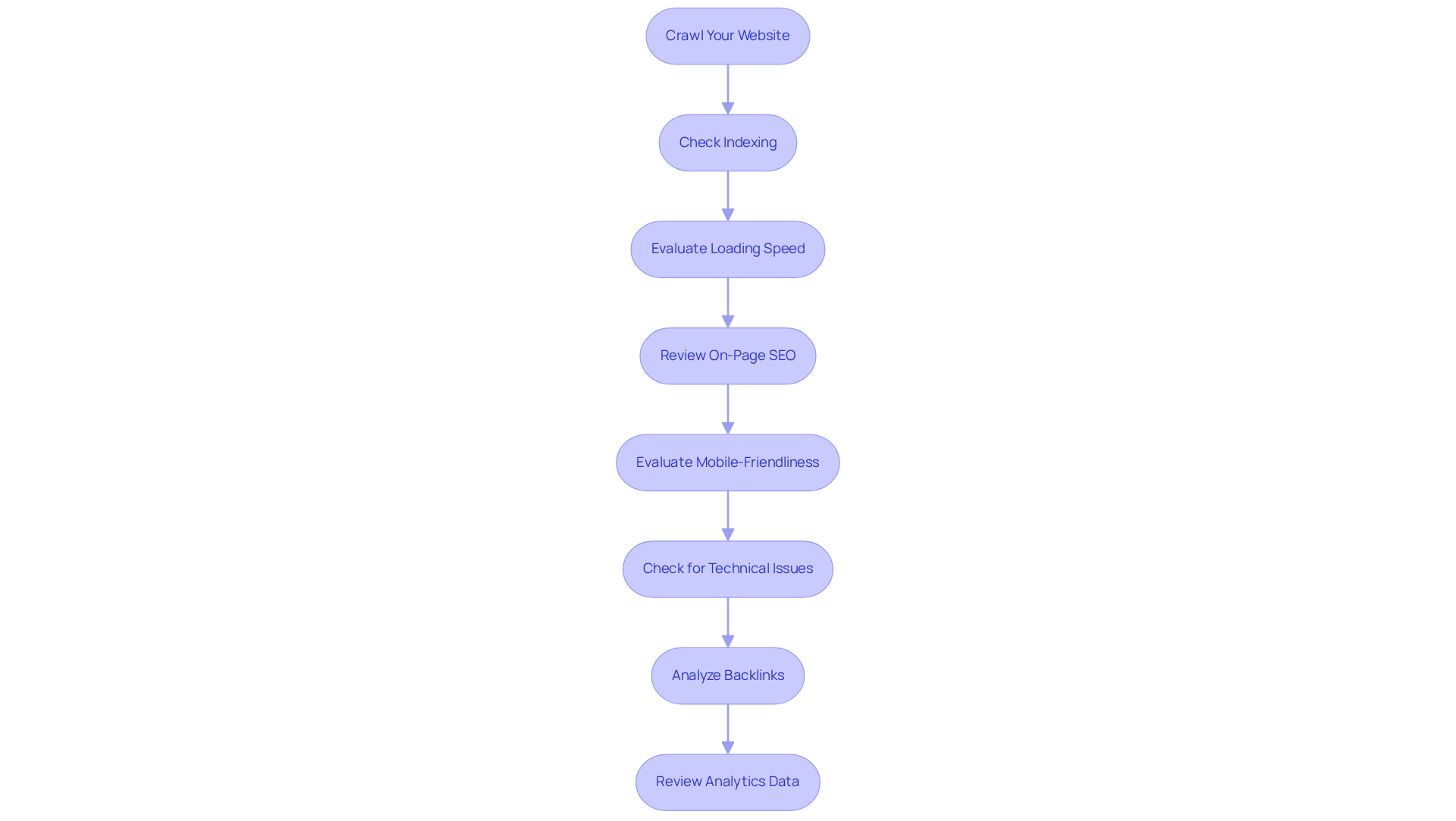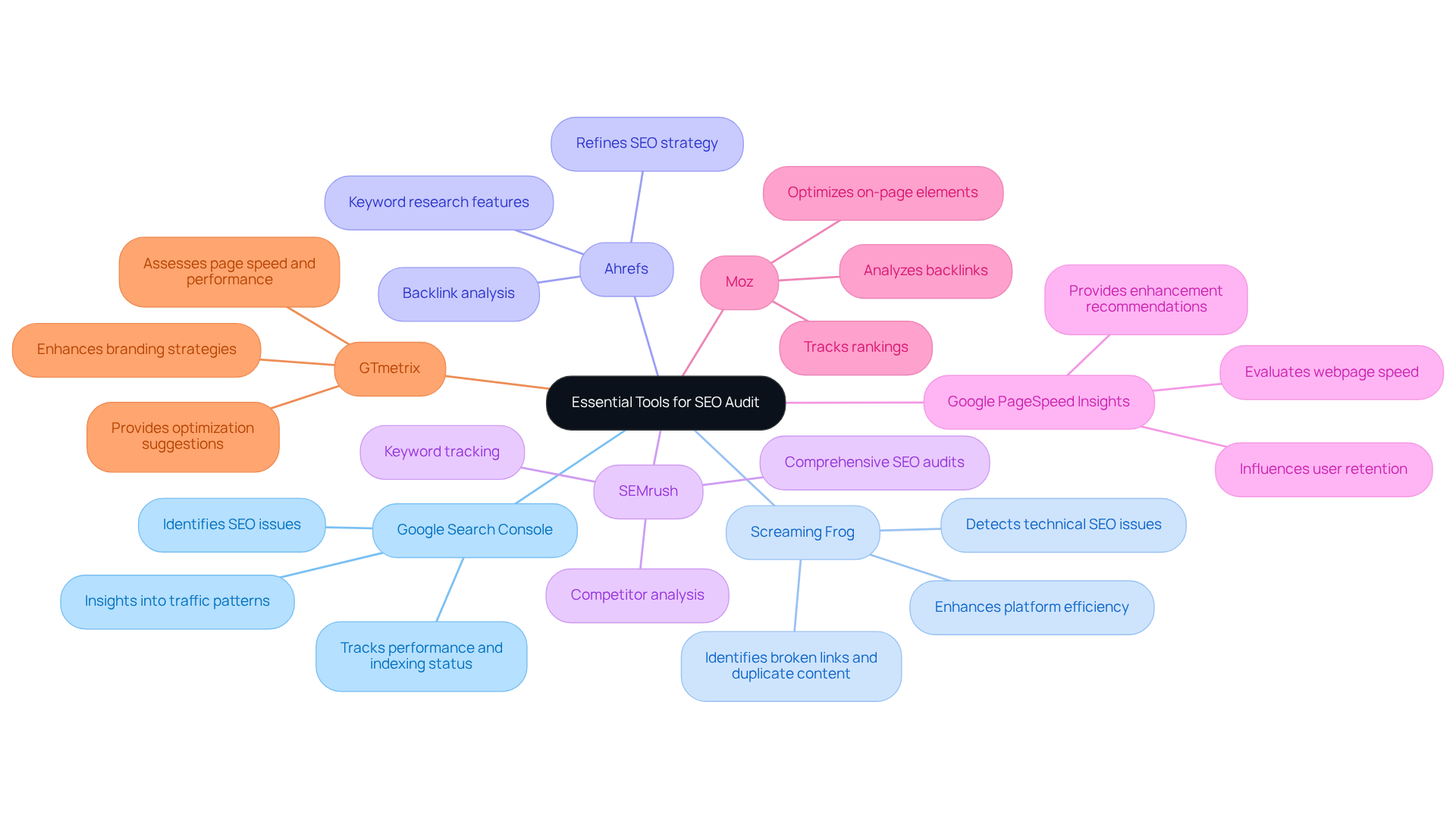Overview
This article highlights a crucial challenge faced by tech startups: the need for improved search engine visibility and user experience. Many founders struggle with getting their innovative ideas noticed online, which can be disheartening. The implications of this issue can be profound, affecting not just visibility but also the potential for growth and success. However, there is a nurturing solution available: conducting a thorough SEO audit.
The process of performing an SEO audit is not just a technical task; it is a pathway to understanding how to enhance your startup's online presence. By assessing your site structure, evaluating content quality, and identifying technical issues, you can uncover the factors that contribute to your startup's online success. Each step in this audit serves as a building block toward creating a more visible and user-friendly website.
As you embark on this journey, remember that you are not alone. Many founders have faced similar challenges, and by sharing experiences and insights, we can create a supportive community. Conducting an SEO audit is an empowering step that can lead to meaningful improvements, nurturing your startup's growth in the digital landscape. Embrace this opportunity to connect with your audience and enhance their experience on your site.
Introduction
For tech startups navigating the digital landscape, the stakes can feel overwhelming when it comes to online visibility. An effective SEO audit can uncover hidden opportunities and critical weaknesses that profoundly affect search engine rankings and user experience. Yet, many founders find themselves grappling with the complexities of conducting such audits, often left wondering how to optimize their web presence effectively.
What if a systematic approach could not only illuminate the path to improved visibility but also empower startups to thrive amidst fierce competition? We understand these challenges, and we are here to help you discover the solutions that can make a difference.
Define SEO Audit and Its Importance for Tech Startups
Although an audit website seo may seem daunting, it is a crucial step for any website striving for success in search engines. This thorough assessment evaluates various factors such as site structure, content quality, and technical elements that significantly impact engine rankings. For tech startups, the importance of conducting an audit website seo cannot be overstated; it helps uncover weaknesses and opportunities for improvement, ensuring that your website is not only optimized for search engines but also provides a positive user experience.
Imagine pouring your heart into your startup, only to find that potential customers can’t discover you online. This is a common pain point that many founders face. Regularly conducting an audit website seo can help illuminate the path forward, enhancing visibility and driving organic traffic—essential components for growth in today’s competitive digital landscape. As algorithms and market trends evolve, adapting your strategy through consistent audit website seo becomes a cornerstone of a successful digital approach.
Statistics reveal that a good SEO audit score typically ranges from 80-100%, with scores of 90-100% being outstanding. This underscores the importance of of audit website seo. Additionally, links play a vital role in how Google discovers content, highlighting the necessity for a comprehensive audit that includes link analysis. As Ashkar Gomez wisely states, 'Good SEO work only gets better over time.' This sentiment reinforces the need to audit website SEO on an ongoing basis, allowing you to thrive and flourish in the ever-changing digital landscape. Remember, you are not alone on this journey; together, we can navigate the complexities of SEO and ensure your startup shines brightly online.

Step-by-Step Process for Conducting an SEO Audit
- Crawl Your Website: Have you ever felt overwhelmed by the complexities of your web presence? It’s common to encounter issues like broken links, duplicate content, and missing meta tags, which can really hurt your SEO performance. Tools like Screaming Frog or Ahrefs can assist you in the process to audit website SEO by conducting a thorough crawl of your site. Remember, a staggering 96.55% of web pages receive no organic traffic due to a lack of backlinks, highlighting just how crucial it is to identify crawl issues.
- Check Indexing: It’s disheartening to think that your hard work might not be recognized by web crawlers. Make sure your webpage is correctly indexed by using Search Console to uncover any indexing problems that could prevent your pages from appearing in search results.
- Evaluate Loading Speed: We all know how frustrating it can be when a webpage takes too long to load. Aim for a loading time of under 3 seconds, as each extra second can decrease conversion rates by about 4.42%. Tools like PageSpeed Insights can help you assess your loading performance, emphasizing the crucial importance of speed in keeping your visitors engaged.
- Review On-Page SEO: Your title tags, meta descriptions, headers, and content all play a vital role in attracting visitors. High-quality content can drive traffic boosts of up to 10 times compared to less effective content. Did you know that the typical first-page outcome in search engines includes around 1,890 words? This highlights the significance of content length in SEO, so take a moment to scrutinize your on-page elements for keyword optimization and relevance.
- Evaluate Mobile-Friendliness: With accounting for 58% of all Google queries, it’s essential to ensure your platform is responsive and provides an optimal user experience. Use Google’s Mobile-Friendly Test tool to confirm that your webpage meets mobile usability standards, as this can significantly impact your audience’s experience.
- Check for Technical Issues: Technical problems like crawl errors, HTTPS security, and the presence of an XML sitemap can be daunting. Addressing these concerns is key to maintaining a healthy site structure and enhancing visibility in search results, so it is important to audit website SEO. Remember, HTTPS websites make up 70.4% of voice query result pages, underscoring the importance of security in technical SEO.
- Analyze Backlinks: Backlinks are the lifeblood of your SEO efforts. Using tools like Moz or Ahrefs, evaluate your backlink profile and identify any toxic links that could harm your visibility. After all, 43% of eCommerce traffic comes from organic search, which highlights the significance of backlinks in driving traffic.
- Review Analytics Data: Understanding your audience is crucial. Utilize Analytics to delve into traffic sources, user behavior, and conversion rates. This data can illuminate areas for improvement and help refine your SEO strategies effectively. It’s worth noting that 61% of marketers believe SEO is significant for online success, reinforcing the importance of analyzing analytics data to support your growth.

Essential Tools and Resources for Your SEO Audit
- Google Search Console: For many tech startup founders, navigating the digital landscape can feel overwhelming. This tool is essential for tracking performance, indexing status, and identifying problems that may obstruct your SEO efforts. It offers insights into traffic patterns and assists in pinpointing issues impacting your web presence. With 68% of online experiences starting with a search engine, Google Search Console becomes a crucial ally in your journey to enhance visibility and connect with your audience.
- Screaming Frog: Technical SEO problems can be daunting, but Screaming Frog is here to help. This powerful website crawler detects issues like broken links, duplicate content, and missing metadata, allowing you to enhance your platform efficiently. As John Mueller from Google emphasizes, backlinks are vital for helping Google discover your content, and addressing these technical issues is a critical first step toward success.
- Ahrefs: Understanding your webpage's authority and competitive landscape can be challenging, yet Ahrefs makes it manageable. Known for its backlink analysis and keyword research features, this tool provides valuable insights that assist you in refining your SEO strategy. Businesses typically invest between $500 and $7,500 per month on SEO services, underscoring the importance of utilizing tools like Ahrefs to maximize your return on investment and ensure your efforts yield fruitful results.
- SEMrush: The world of SEO can feel like a maze, but SEMrush offers a comprehensive solution. This tool provides audits, keyword tracking, and competitor analysis, making it an all-in-one resource to audit website SEO and enhance your online presence. With over 50% of marketers stating that SEO delivers the highest ROI among marketing strategies, SEMrush stands as a vital resource for tech startups aiming to thrive in a competitive market.
- Google PageSpeed Insights: Slow loading times can frustrate users, leading to lost opportunities. By evaluating your web page's speed, this tool offers practical recommendations for enhancement, which is crucial since 40% of users leave platforms that take longer than three seconds to load. Improving webpage speed can significantly influence user retention and engagement, helping you connect with your audience more effectively.
- Moz: Tackling diverse challenges in the digital landscape can feel like an uphill battle, but Moz provides the tools you need to succeed. With capabilities for tracking rankings, analyzing backlinks, and optimizing on-page elements, Moz ensures that your SEO efforts are well-rounded and effective. Incorporating this tool into your strategy can help you navigate the complexities of the online world with confidence.
- GTmetrix: Maintaining a competitive edge in rankings requires attention to detail, and GTmetrix is here to assist. This tool assesses page speed and performance, providing comprehensive reports on loading times and optimization suggestions. As highlighted in RNO1's collaboration with Highline, effective use of these tools can lead to and enhanced customer engagement, ensuring your startup stands out in the digital realm.

Troubleshooting Common SEO Audit Challenges
- Crawl Errors: Have you ever felt frustrated when your website isn't performing as it should? Crawl errors can be a significant hurdle, especially when critical pages are unintentionally blocked from indexing. Regularly conducting an audit website seo can be a lifesaver, helping you spot and fix these issues quickly. It's worth noting that 95.2% of websites face common technical problems like this. As Glenn Gabe wisely points out, 'there’s never one smoking gun, there’s typically a battery of them,' highlighting the importance of a thorough audit website seo to ensure your site is fully optimized.
- Slow Page Speed: Imagine your potential customers clicking away due to slow loading times. To prevent this, consider optimizing images, leveraging browser caching, and reducing JavaScript. With 88.5% of users citing slow loading times as a primary reason for abandoning websites, enhancing speed is essential for keeping visitors engaged. Neil Patel reminds us that to ensure a website stands strong, it's crucial to audit website seo. And that backbone is technical SEO, reinforcing that addressing page speed is a vital part of your overall audit website SEO strategy.
- Duplicate Content: Duplicate content can be a sneaky issue that undermines your platform's authority. Implementing canonical tags is a proactive step to audit website SEO by specifying the preferred version of a page, helping you avoid penalties from search engines. This practice is crucial for maintaining your rankings and ensuring your hard work pays off.
- Indexing Issues: Are you worried that some of your pages aren’t showing up in search results? If certain pages are not indexed, it's important to check that they are linked internally and free from any noindex tags. Proper internal linking is vital for an audit website seo, considering that 63% of B2B users first seek information on a company's website. Ensuring your pages are easily discoverable can make all the difference.
- Backlink Issues: Toxic backlinks can harm your webpage's authority, but you don’t have to face this challenge alone. Identifying and disavowing these links via Google Search Console is a protective measure you can take. Given that 92% of marketing specialists believe link building will be a key ranking factor in the next five years, maintaining a healthy backlink profile is essential. As Rand Fishkin advises, "Don’t build links. Build relationships," reminding us that fostering genuine connections is key to successful backlink strategies.
- Mobile Usability Problems: Have you tested your website on various devices lately? Conducting regular tests across different devices and browsers ensures a consistent user experience. With 68% of online orders occurring via smartphones, is crucial for attracting and retaining customers. Notably, 77% of retail site traffic came from smartphones in Q3 2024, underscoring the importance of mobile optimization. By addressing these issues, you're not just improving your site; you're also enhancing the user experience as you audit website seo.

Conclusion
Conducting a thorough SEO audit is a vital step for tech startups striving to enhance their online presence and attract organic traffic. Many founders face the daunting challenge of navigating the complexities of digital visibility. By systematically evaluating elements such as site structure, content quality, and technical performance, startups can identify weaknesses that may be holding them back and seize opportunities for growth. This proactive approach not only boosts search engine rankings but also cultivates a positive user experience, which is essential for the startup's success.
The article highlights a comprehensive step-by-step process for performing an SEO audit, underscoring the importance of tools like Google Search Console, Screaming Frog, and Ahrefs. Each step, from crawling the website to analyzing backlinks and reviewing analytics data, plays a crucial role in uncovering issues that could hinder visibility and performance. Moreover, addressing common challenges—such as crawl errors, slow page speeds, and mobile usability problems—is imperative for maintaining a competitive edge in today’s digital landscape.
In conclusion, it’s essential for tech startups to prioritize SEO audits as a foundational element of their digital strategy. By committing to regular assessments and leveraging the right tools, founders can navigate the complexities of SEO with confidence. Embracing this ongoing process not only enhances visibility but also serves as a catalyst for growth in an increasingly competitive environment. Taking action today can lead to significant improvements in online presence, ensuring that startups are well-positioned to attract and retain customers in the future. Remember, you are not alone in this journey; many have walked the same path and found success through dedication and the right strategies.
Frequently Asked Questions
What is an SEO audit?
An SEO audit is a thorough assessment of a website that evaluates various factors such as site structure, content quality, and technical elements that impact search engine rankings.
Why is an SEO audit important for tech startups?
An SEO audit is crucial for tech startups as it helps uncover weaknesses and opportunities for improvement, ensuring that the website is optimized for search engines and provides a positive user experience.
How can an SEO audit enhance visibility for a startup?
Regularly conducting an SEO audit can illuminate the path forward for startups, enhancing their visibility and driving organic traffic, which are essential for growth in a competitive digital landscape.
What is a good SEO audit score?
A good SEO audit score typically ranges from 80-100%, with scores of 90-100% being considered outstanding.
Why are links important in an SEO audit?
Links play a vital role in how Google discovers content, highlighting the necessity for a comprehensive audit that includes link analysis.
How often should a startup conduct an SEO audit?
It is recommended to conduct an SEO audit on an ongoing basis to adapt to evolving algorithms and market trends, which is essential for a successful digital strategy.
What can be expected from a well-executed SEO audit?
A well-executed SEO audit can help startups thrive and flourish online by identifying areas for improvement and ensuring that their digital presence remains strong in an ever-changing landscape.




